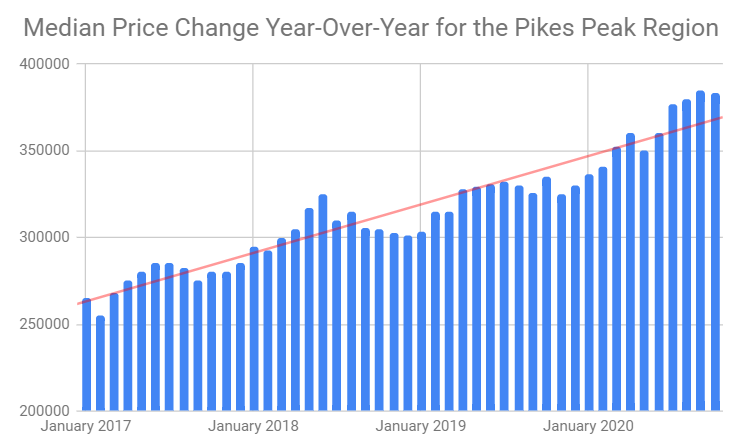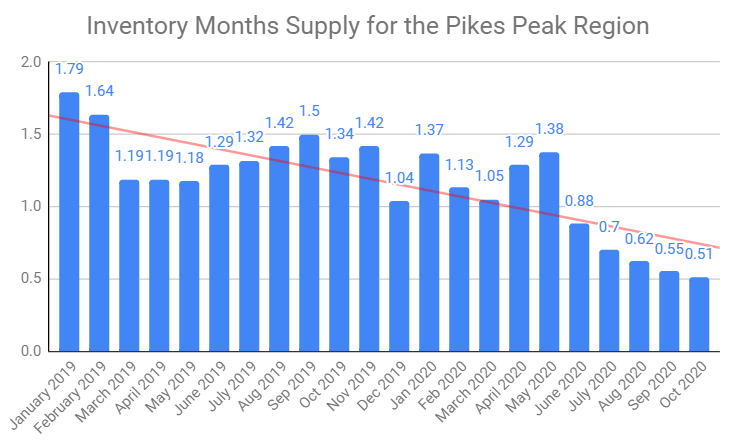Colorado Springs Cost of Living Sees Increase
Colorado Springs has been nominated as one of the best places to live; however, it’s not as affordable as it used to be. We have seen record-breaking prices in the real estate market, which is contributing to the higher cost of living in our area. According to The Gazette, “The local cost of living was 103.6% of the national average in the third quarter, up from 100.9% a year earlier and the highest level the quarterly index has reached since mid-1997 (Council for Community and Economic Research)”. The cost of living is the amount of money needed to cover basic expenses such as housing, food, taxes, and healthcare in a certain place and time period. The cost of living index is used to compare how expensive it is to live in one city versus another.
Housing Costs
A good part of the increase is due to the rise in housing costs in our area. We are seeing double digit increases in both median and average price of homes sold. Last month, the average price rose 16.3% and the median price rose 14.5% (year over year). In fact, when looking at the real estate statistics, 6 out of the last 10 months have seen double digit increases. Just 5 years ago, the average price was $263,584 and the median price was $234,900. Last month the average was $432,477 and the median price was $383,447. As you can see, in just 5 years, the median and average prices have risen nearly $150,000! Building materials have increased in price, and thus so has the price of new construction homes. High demand and lack of inventory have also contributed to this unprecedented surge in prices.
Even still, did you know that you can still afford more house than ever before? This is due to record low interest rates! If you’re planning to wait until next year or later, Mike Fratantoni, Chief Economist at the Mortgage Bankers Association (MBA), forecasts mortgage rates will begin to steadily rise, so waiting could cost you even more!

Low Inventory Contributes to Rising Housing Costs
Our local inventory has been shrinking this year. We had the lowest inventory recorded last month, at only a 0.51-month (or 16 day) supply of homes in the entire Pikes Peak Region. Looking at homes with a Colorado Springs mailing address, there was only a 0.38-month or 11 day supply of homes! This tight inventory continues to put pressure on price and has contributed to bidding wars and extremely short time on market for listings. Purchaser demand is so high, the market is running out of available homes for sale. Just last week, realtor.com reported:
“Since the beginning of the COVID pandemic in March, nearly 400,000 fewer homes have been listed compared to last year, leaving a gaping hole in the U.S. housing inventory.”
The low inventory is creating fierce competition among buyers and bidding wars for homes. When demand is high and inventory is low, people will pay more. COVID-19 has not helped the situation, as many people are reluctant to sell their home during this time. This leaves buyers with less homes to choose from, and they are paying higher prices just to have an offer accepted.

Increase in Population
In addition to rising home prices and low inventory, the overall population of our area has grown substantially, and continues to grow every year! The population of El Paso County is around 720,403 people (according to Census.gov estimates for July 2019). This is a 15.8% increase in population since the last official census in 2010. This increase in population is contributing to higher demand for homes, less inventory, and subsequently, higher costs for housing.
According to US News & World Report, Colorado Springs was nominated as the #4 Best Place to Live in 2020. This report is based on desirability, job market, quality of life, and more. Many people choose to move to our city for better opportunities in employment and education. Colorado Springs’ natural beauty and outdoor activities also entice newcomers.
However, many of those migrating here from more expensive areas still see Colorado Springs as an affordable alternative. Unfortunately, those with lower paying or less secure jobs may find the rising costs problematic, and may even get priced out of the area entirely. The cost of living in most other major cities far exceeds that of Colorado Springs, while our area still provides many of the same opportunities.

Other Costs in Colorado Springs
Other costs play an effect on the overall cost of living. These costs include transportation, healthcare, taxes, utilities, childcare, food, and more. According to The Gazette article, “Transportation and utilities costs also played a role in pushing the overall index higher. The component measuring transportation costs surged from 99.1% of the national average a year ago to 111.6% of the national average in the third quarter, mostly because local gasoline prices fell just 5.1%, while the national average declined 19.1% Utilities costs also rose from 98.7% to 102.8% of the national average during the same period.” Rising prices of these goods can seriously affect the cost of living and affordability of our area.
Future of Our Area
The cost of living in Colorado Springs continues to rise each year, and it does not look like that will stop any time soon. The longer you wait to move here or buy a home, the more you will end up paying. If making Colorado Springs your home is your dream, let’s chat and try to make that happen! If you are renting and ready to own a home of your own, let’s get you on the path to make homeownership a reality! Remember, next year that same house will cost you even more. Even with the higher cost of living, Colorado Springs remains one of the most amazing places to live!





Pingback: Migration and rental trends in Colorado Springs - Forest Meadows News
Pingback: Migration and Rental Trends in Colorado Springs - Living Colorado Springs
Pingback: Colorado Springs Cost of Living Sees Increase - Human Habitat Providers